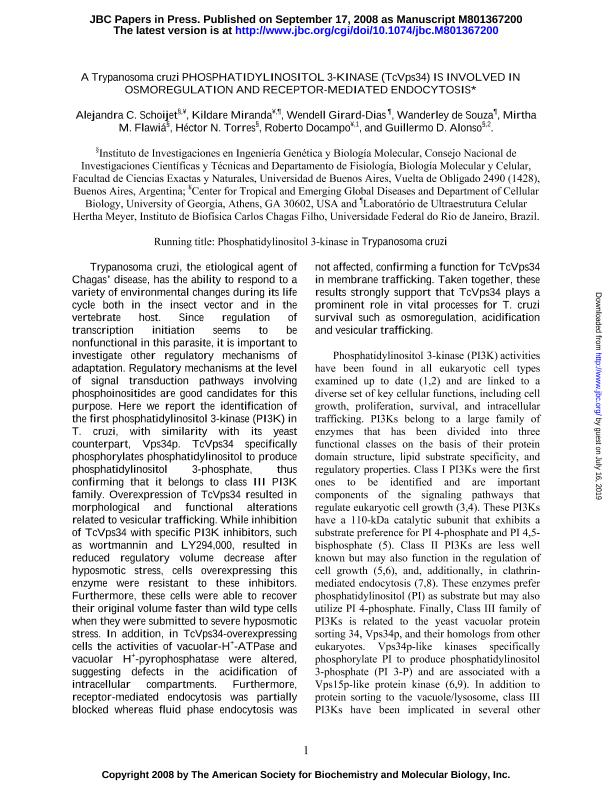Artículo
A Trypanosoma cruzi phosphatidylinositol 3-kinase (TcVps34) is involved in osmoregulation and receptor-mediated endocytosis
Schoijet, Alejandra Cecilia ; Miranda, Kildare; Girard Dias, Wendell; De Souza, Wanderley; Flawia, Mirtha Maria
; Miranda, Kildare; Girard Dias, Wendell; De Souza, Wanderley; Flawia, Mirtha Maria ; Torres, Hector Norberto
; Torres, Hector Norberto ; Docampo, Roberto; Alonso, Guillermo Daniel
; Docampo, Roberto; Alonso, Guillermo Daniel
 ; Miranda, Kildare; Girard Dias, Wendell; De Souza, Wanderley; Flawia, Mirtha Maria
; Miranda, Kildare; Girard Dias, Wendell; De Souza, Wanderley; Flawia, Mirtha Maria ; Torres, Hector Norberto
; Torres, Hector Norberto ; Docampo, Roberto; Alonso, Guillermo Daniel
; Docampo, Roberto; Alonso, Guillermo Daniel
Fecha de publicación:
11/2008
Editorial:
American Society for Biochemistry and Molecular Biology
Revista:
Journal of Biological Chemistry (online)
ISSN:
0021-9258
Idioma:
Inglés
Tipo de recurso:
Artículo publicado
Clasificación temática:
Resumen
Trypanosoma cruzi, the etiological agent of Chagas disease, has the ability to respond to a variety of environmental changes during its life cycle both in the insect vector and in the vertebrate host. Because regulation of transcription initiation seems to be nonfunctional in this parasite, it is important to investigate other regulatory mechanisms of adaptation. Regulatory mechanisms at the level of signal transduction pathways involving phosphoinositides are good candidates for this purpose. Here we report the identification of the first phosphatidylinositol 3-kinase (PI3K) in T. cruzi, with similarity with its yeast counterpart, Vps34p. TcVps34 specifically phosphorylates phosphatidylinositol to produce phosphatidylinositol 3-phosphate, thus confirming that it belongs to class III PI3K family. Overexpression of TcVps34 resulted in morphological and functional alterations related to vesicular trafficking. Although inhibition of TcVps34 with specific PI3K inhibitors, such as wortmannin and LY294,000, resulted in reduced regulatory volume decrease after hyposmotic stress, cells overexpressing this enzyme were resistant to these inhibitors. Furthermore, these cells were able to recover their original volume faster than wild type cells when they were submitted to severe hyposmotic stress. In addition, in TcVps34-overexpressing cells, the activities of vacuolar-H+-ATPase and vacuolar H+- pyrophosphatase were altered, suggesting defects in the acidification of intracellular compartments. Furthermore, receptor-mediated endocytosis was partially blocked although fluid phase endocytosis was not affected, confirming a function for TcVps34 in membrane trafficking. Taken together, these results strongly support that TcVps34 plays a prominent role in vital processes for T. cruzi survival such as osmoregulation, acidification, and vesicular trafficking.
Palabras clave:
Tcvps34
,
Trypanosoma
,
Osmorregulation
,
Endocytosis
Archivos asociados
Licencia
Identificadores
Colecciones
Articulos(INGEBI)
Articulos de INST.DE INVEST.EN ING.GENETICA Y BIOL.MOLECULAR "DR. HECTOR N TORRES"
Articulos de INST.DE INVEST.EN ING.GENETICA Y BIOL.MOLECULAR "DR. HECTOR N TORRES"
Citación
Schoijet, Alejandra Cecilia; Miranda, Kildare; Girard Dias, Wendell; De Souza, Wanderley; Flawia, Mirtha Maria; et al.; A Trypanosoma cruzi phosphatidylinositol 3-kinase (TcVps34) is involved in osmoregulation and receptor-mediated endocytosis; American Society for Biochemistry and Molecular Biology; Journal of Biological Chemistry (online); 283; 46; 11-2008; 31541-31550
Compartir
Altmétricas



